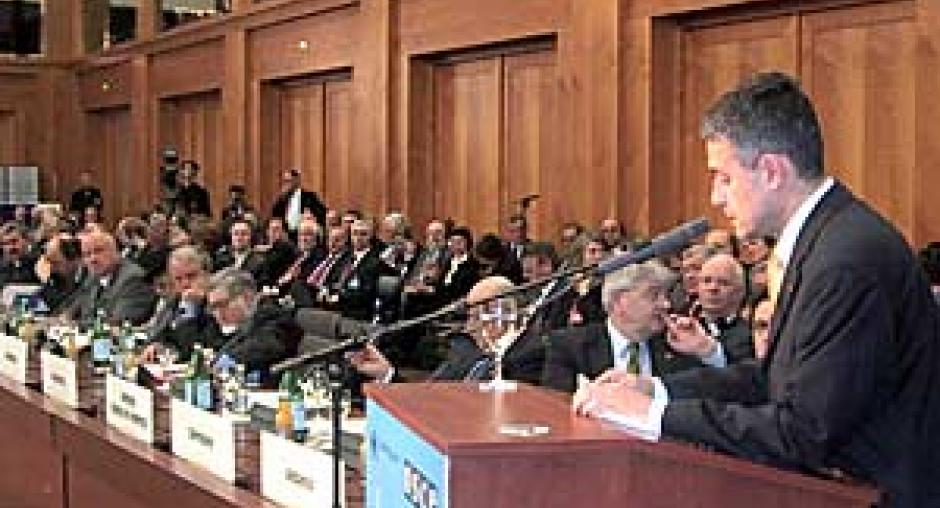Newsroom
Chairman-in-Office stresses crucial role of education in challenging anti-Semitism across OSCE area
BERLIN 28 April 2004

(OSCE)Chairman Solomon Passy addressed more than 500 delegates from the 55 OSCE States and their 10 partner countries in the second OSCE Conference on Anti-Semitism, Berlin, 28 April 2004. (OSCE) Photo details
BERLIN, 28 April 2004 - Opening the OSCE's second conference on anti-Semitism today, the Organization's Chairman-in-Office, Bulgarian Foreign Minister Solomon Passy, warned that the "murder of memory", allowing the remembrance of the Holocaust to slowly fade away, was the surest way to repeat the same mistakes made in the last century.
"It is our moral duty not to forget and to keep speaking about the Holocaust as a way of preventing new forms of genocide," said Minister Passy.
Education was key. "Bias is learned in childhood. Special importance has to be given to the promotion of educational programmes for combating Anti-Semitism and of education about the Holocaust and about respect for all ethnic and religious groups. Parallel to this, there should be a drive to combat hate crimes, fuelled by racist, xenophobic and anti-Semitic propaganda in the media and on the Internet."
In his opening remarks, German President Johannes Rau said the OSCE had been the first security organization to recognise the relationship between international security and human rights.
"Our security is indissolubly linked with the protection of our common values," he said. "The OSCE sees itself as the Organization that sets standards, and encouraging respect for human rights is one of its most important responsibilities."
Minister Passy said the Berlin Conference was an opportunity to reach agreement on a set of recommendations on fighting anti-Semitism in all 55 OSCE participating States, including concrete measures to raise public awareness and create "zero tolerance for intolerance".
The entire media industry had a special responsibility in this respect, the Chairman-in-Office added: "But we are aware that neither regulation nor self-regulation can be effective without the support of civil society. And therefore we should encourage and support the efforts of NGOs in all these areas."
He told over 500 delegates from the OSCE States and their 10 partner countries that the OSCE took the problem of resurgent anti-Semitism seriously. The Bulgarian Chairmanship had actively supported efforts to follow up the work started at the first OSCE Conference on Anti-Semitism, held in Vienna in June last year.
The Chairman-in-Office said supra-national organizations such as the OSCE, the European Union and NATO provided reliable protection for democratic freedoms and made it more difficult for anti-Semitism, xenophobia and intolerance to gain a foothold.
"It is less likely for inter-ethnic conflicts to flare and for human rights and freedoms to be violated in areas where these alliances have an influence," he added.
Irish Foreign Minister Brian Cowen, speaking on behalf of the European Union, said the EU strongly supported the OSCE's work on these fundamental and urgent human rights issues: "The EU agrees that the OSCE's approach should be action oriented, focusing on practical measures."
Further conferences are planned by the OSCE Chairmanship for Paris in June, focusing on Internet use in hate crime and the spreading of racist, xenophobic and anti-Semitic propaganda, as well as an event in Brussels in September, looking at the wider problems of racism, xenophobia and discrimination in society.
"It is our moral duty not to forget and to keep speaking about the Holocaust as a way of preventing new forms of genocide," said Minister Passy.
Education was key. "Bias is learned in childhood. Special importance has to be given to the promotion of educational programmes for combating Anti-Semitism and of education about the Holocaust and about respect for all ethnic and religious groups. Parallel to this, there should be a drive to combat hate crimes, fuelled by racist, xenophobic and anti-Semitic propaganda in the media and on the Internet."
In his opening remarks, German President Johannes Rau said the OSCE had been the first security organization to recognise the relationship between international security and human rights.
"Our security is indissolubly linked with the protection of our common values," he said. "The OSCE sees itself as the Organization that sets standards, and encouraging respect for human rights is one of its most important responsibilities."
Minister Passy said the Berlin Conference was an opportunity to reach agreement on a set of recommendations on fighting anti-Semitism in all 55 OSCE participating States, including concrete measures to raise public awareness and create "zero tolerance for intolerance".
The entire media industry had a special responsibility in this respect, the Chairman-in-Office added: "But we are aware that neither regulation nor self-regulation can be effective without the support of civil society. And therefore we should encourage and support the efforts of NGOs in all these areas."
He told over 500 delegates from the OSCE States and their 10 partner countries that the OSCE took the problem of resurgent anti-Semitism seriously. The Bulgarian Chairmanship had actively supported efforts to follow up the work started at the first OSCE Conference on Anti-Semitism, held in Vienna in June last year.
The Chairman-in-Office said supra-national organizations such as the OSCE, the European Union and NATO provided reliable protection for democratic freedoms and made it more difficult for anti-Semitism, xenophobia and intolerance to gain a foothold.
"It is less likely for inter-ethnic conflicts to flare and for human rights and freedoms to be violated in areas where these alliances have an influence," he added.
Irish Foreign Minister Brian Cowen, speaking on behalf of the European Union, said the EU strongly supported the OSCE's work on these fundamental and urgent human rights issues: "The EU agrees that the OSCE's approach should be action oriented, focusing on practical measures."
Further conferences are planned by the OSCE Chairmanship for Paris in June, focusing on Internet use in hate crime and the spreading of racist, xenophobic and anti-Semitic propaganda, as well as an event in Brussels in September, looking at the wider problems of racism, xenophobia and discrimination in society.
